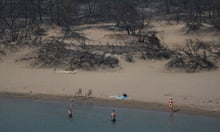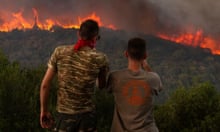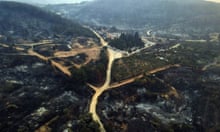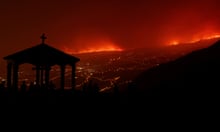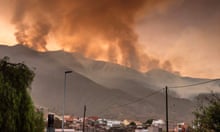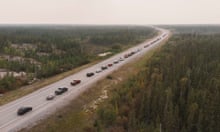A heatwave in one of the world’s coldest regions has sparked forest fires and threatened the Siberian city of Yakutsk with an “airpocalypse” of thick toxic smoke, atmospheric monitoring services have reported.
High levels of particulate matter and possibly also chemicals including ozone, benzene and hydrogen cyanide are thought likely to make this one of the world’s worst ever air pollution events.
Local authorities have warned the 320,000 residents to stay indoors to avoid choking fumes from the blazes, which are on course to break last year’s record.
Satellite analysts say regional levels of PM2.5 – small particles that can enter the bloodstream and damage human organs – have surged beyond 1,000 micrograms a cubic metre in recent days, which is more than 40 times the recommended safe guideline of the World Health Organization.
On Tuesday, live air quality monitors for Yakutsk measured PM 2.5 levels of 395 micrograms. This fell into the extreme category of “airpocalypse”, which is defined as “immediate and heavy effects on everybody”. Russian social media accounts have shown images of readings that are more than 17 times worse than the average in even the most polluted cities of India and China.

Scientists see human-caused climate disruption as an important factor. Yakutsk, the capital of Russia’s north-east Sakha Republic – also known as Yakutia – is the coldest winter city on the planet, but due to global heating, summer temperatures here have been rising at least 2.5 times faster than the world average.
Last year, during an unusually prolonged heatwave in the wider Siberian region temperatures remained more than 5C above average from January to June, causing permafrost to melt, buildings to collapse, and sparking an unusually early and intense start to the forest fires season. Scientists said this was made 600 times more likely by exhaust fumes, industrial emissions, deforestation and other human activities.
The record-breaking trend resumed this spring, earlier than usual and slightly further south than last year, near more populated areas such as Yakutsk. Much of the surrounding area is dense taiga forest, which ignites more easily when hot and dry.
The Siberian Times reported the first fire in the beginning of May outside Oymyakon in north-east Yakutia, which is known as “the pole of cold” for its record low temperatures. As the blazes widened, more than 2,000 firefighters were deployed across the region and drafted in from outside.
Military planes have been used to douse forests with water and seed clouds with silver iodide and liquid nitrogen to induce rainfall. Some desperate communities have reportedly even drafted children into the fight to hold back the flames. Overall, this has been described as the biggest fire-fighting operation in the region since the end of the Soviet Union.
Despite these efforts, dozens of fires rage out of control. Horrifying video from the region shows dense black smoke and red flames alongside the Kolyma highway, which was known as the Road of Bones during the Soviet era. This trunk road has since been closed. Tourists on a boat on the Lena River have posted phone clips of their cruise past burning hiillsides.
Last week Sakha’s emergencies ministry said more than 250 fires were burning across 5,720 sq km – an area about twice the size of Luxembourg. Satellite images from the US space agency Nasa have shown vast plumes rising into the atmosphere.
Based on satellite observations, the European Union’s Copernicus Atmosphere Monitoring Service reported that forest fires in the Sakha Republic have released 65 megatonnes of carbon since 1 June, which is well above the average for 2003-2020. This is already the second highest total ever and it could beat last year’s record if the current trend continues until the usual end of the fire season in late August.
The forest smoke contains more toxins than even the most polluted urban centres. Mark Parrington, a senior scientist at Copernicus, said analysis of atmospheric aerosols from Sakha’s fires suggested surface levels of PM2.5 levels above 1,000 micrograms a cubic metre of air, in addition to other potential constituents such as ozone, ammonia, benzene, hydrogen cyanide and organic aerosols. By comparison, the annual average in famously smoggy cities like Beijing, Hotan, New Delhi and Ghaziabad is between 100 and 110.
Parrington said climate change was helping to create the conditions for more fires in northern boreal forests in Siberia, Canada, and northern Europe – all of which are heating faster than the global average. This is in keeping with a broader global trend of fires moving from grasslands to fuel-rich forests, which emit more carbon.
Alexey Yaroshenko, head of the forest department in Greenpeace Russia, said poor forest management, weak regulation and budget cuts had compounded the fire risks. “For many years, propaganda has made people think that the climate crisis is a fiction, and if not fiction, that it will only benefit Russia, since it will become warmer and more comfortable. Now the situation is starting to change,” he wrote in an email.
“Little by little, people are beginning to understand that the climate is really changing, and the consequences are really catastrophic. But the majority of society and the majority of politicians are still very far from understanding the real scale of the problem.”
